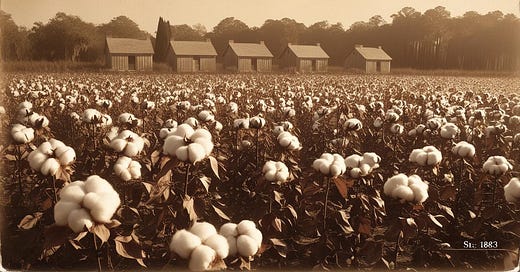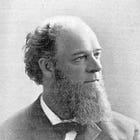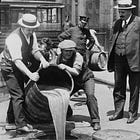To get the most enjoyment out of this serialized story, please start at the beginning.
Release Date: May 20, 2025
A Vicksburg holiday tradition
When George Gardner and William Eckman stepped off the deck of the Richmond and onto the Vicksburg landing on December 23, 1883, they traded the stentorian horn of the steamboat for the nerve-shattering squawking of hundreds of tin horns. The city of some 12,000 people was celebrating the hoped for arrival of Santa Claus a day early, and creating what George described in his log as “such an orgy of noise as would put to shame a Northern Fourth of July”.
The amount of noise in the ordinary small boy is an unknown quantity, but the Vicksburg small boy…is in point of noise no ordinary boy, and he remains a “boy” until he is well along in years, his noise-producing propensities developing with his years.
The noises produced and dispensed with characteristic liberality were of no particular kind of quality. Each individual boy seemed to have a job lot. Where he stored it all was a mystery, for this boy is, as a rule, a thin and underfed starveling, a sunburned cadaver in rags. Noise was king and the boy was the power behind the throne. 1
If only George had read the local papers while idling onboard the side-wheeler, he’d have known what to expect: Christmas in Vicksburg was always a noisy spectacle.
Christmas with its fun and frolic, and ceremonies, solemn, instructive and amusing; its music and fireworks, and eggnog and turkey and wine and fruit and pies and cakes and colic, and joy and happiness and misery and loneliness, and rain and mud and slush and Sante Klaus and tin horns – is at hand, and young America reigns. Those who cannot enter into the spirit of the season had better hie themselves to a sequestered spot until the storm has passed. 2
By the morning of the 25th, the streets of Vicksburg were once again quiet, a change as welcome as it was sudden.
After putting their canoes in the water and bidding farewell to new friends and the sleeping city, George and William pointed their crafts downstream toward little known places with names like Hardscrabble, Waterpoof and Avalanche Landing, but better known names as well; Natchez, Baton Rouge and finally New Orleans — just 365 miles away.
That it was Christmas Day may not even have registered with George and his companion.
Then again, in the solitude of their canoes, maybe it was all the two men could think about.
Please hit the ❤️ button at the bottom of the page to help this story reach more readers. And if you’re not already a subscriber, I’d love to have you join me. Thanks!
Christmas on Cleveland’s Millionaire’s Row
Christmas at 7030 Euclid Street in the heart of what Mark Twain called “"the grandest, most beautiful street in all the world", and what others simply referred to as Cleveland’s “Millionaire’s Row”, would have been a grand Victorian affair in 1883, and one fit for the wealth and social standing of the homeowners, George Gardner and his socialite wife, Rosaline Lucretia Oviatt.
The exterior of their imposing Gothic country home — a mansion by even modest standards — would have been adorned with evergreen garlands, red ribbons, and holly, and inside, there would have been a grand tree decorated with handmade ornaments, small toys, candles, strings of cranberries and popcorn, and maybe some early glass ornaments which were becoming available as imports from Germany.
Even in George’s absence, Rosaline and the couple’s seven children, Ellen (23 ), George (20 ), Burt (16), James (14), Anna (10), Kirtland (7), and Ethel (5), would have embraced all the wonder of the holiday.
Christmas morning would have begun with the family gathered around the tree, eagerly opening gifts. At just five, Ethel may have gotten dolls and illustrated books, while the older children likely received more sophisticated presents like fountain pens, leather-bound books, jewelry, or fashionable accessories.
Next would have come church services at Cleveland’s Old Stone Church, the first Presbyterian church in the city, having been established in 1820. Both Rosaline and George were active members of the congregation, raising funds, serving on committees and supporting the church’s many social programs. No doubt, George’s absence would have been acknowledged by fellow congregants, business associates and friends.
After returning home and perhaps changing out of their church clothes, Rosaline and the children would have enjoyed a lavish Christmas dinner around 2 o’clock — a roast turkey with chestnut stuffing and cranberry sauce, perhaps even oysters. There would have been potatoes and squash, Brussel sprouts, and then desserts including plum pudding mince pies and fruit cakes — all prepared and served by members of the Gardner’s household staff.
In the afternoon — the staff having been given leave for the day, friends and family would have arrived bearing gifts, holiday greetings and questions about the status of George’s adventure.
And later, the Gardner house would likely have been filled with music and laughter as the children took turns playing musical instruments and singing carols, maybe even putting on simple plays or reading Christmas stories — A Visit from St. Nicholas or A Christmas Carol were popular choices of the day.
And perhaps later still, nestled beneath furs and blankets, the family would have taken an evening sleigh ride through the snowy streets of Cleveland before retiring for the night in their cozy bedrooms, their thoughts, no doubt, on George — perhaps wondering how he’d celebrated the day on the muddy water of the Mississippi.
And hoping he hadn’t spent it alone.
Christmas on a Louisiana plantation
Some three miles above St. Joseph, LA, — and just shy of fifty miles past Vicksburg, George and William pulled their canoes ashore for the day.
George’s log doesn’t explain the reason for the stop, but it does share what happened next: the two men from Cleveland spent the night, Christmas night, with a man named Ben Coleman, his wife and their three small children.
Not a lot is known about Ben beyond what George recorded in his log:
He’d been born into slavery, but emancipated in his “early manhood”, some two decades earlier. And, like many other formerly enslaved people, Ben had, according to George, “… been too poor to get away from the scene of bondage, with all its repressive influences…”
He had, however, “mastered the art of reading”, whether before or after emancipation, George didn’t know; and had been using his knowledge to help others on the plantation ever since, serving as schoolmaster to both young and old, and teaching them to read, write and cypher.
In Ben, George wrote, he saw a “quiet force and dignity”, that was both exceptional and admirable.
Christmas dinner in the Coleman’s one-room cabin — a place which had formerly housed enslaved people — was a simple affair served on a wooden table surrounded by two backless chairs and a small bench: bacon, hoecake and coffee prepared in a Dutch oven over a fire by Ben’s wife, and dessert taken from the traveler’s supplies.
Sometime during the meal, or perhaps after, as the men sat outside with their pipes, the conversation turned to Louisiana’s sharecropping system, which had emerged after the Civil War, ostensibly as a way for both freedmen and poor white farmers to access land.
“I rent as much land as I can work myself with my mule and cart; for my pay I get half the crop of cotton. What I eat and wear I must buy of my own landlord.”
“And does it pay, Ben?”
“Why, no Sir . You see, Sir , last season was a pretty fair one, but the end I was in debt to the boss; this season the crop is a failure, and you see I couldn't go away if I wanted to. I must stay and work out my debt, which grows all the time.”
“But how is it, Ben, that you get in debt. Don't you get a good price for your cotton?”
“’Tain’t that, Sir, but I guess we pay big for all we eat and wear.”
“And what do you pay?”
“Well, Sir, we pay thirty dollars a barrel for pork, seven dollars a barrel for cornmeal and everything else from proportion.” *
* For reference, in 1883, a barrel of cornmeal in New Orleans was advertised at $3.25.
As the evening wound down, before the two older children fell asleep, before George and William had settled onto the sleeping pallets on the floor near the cabin’s fireplace, a small voice was heard.
The confidence of the innocents was won, and we learned that Santa Claus had overlooked these lowly babies of this son of toil. The little stockings were hung up that night and were not empty in the morning. Wrapped in our blankets, we slept before the fire soundly and well.
It’s not known how George and William came to spend Christmas with Ben and his family. Perhaps his name had come up during their river travels as a man of hospitality. Maybe there was a connection between them that has been lost to history, perhaps reaching back to Civil War days. Then again, their’s might have simply been a random meeting, an offer extended and accepted.
What is known is that the next morning — after what George described as “the best sleep of the journey”, he and William accompanied Ben to his trap line, where “a fine fat ‘possum” was secured for breakfast. The three returned to the cabin, shared a meal and departed better friends than they had begun.
And, if George’s log is to be believed, impacted by their time together: The account of Christmas Day 1883 with Ben and his family is among the most personal, heartfelt and sincere writing George produced.
Copyright 2025 Lori Olson White
For more insight into what Ben’s life might have been like in 1883, read “The Legacy of Beverley Vance (1832-1899) over at Genealogy Just Ask - Robin.
Have you read the incredible true story of Aimee Henry and Mary Martha Parker? Call Me a Bastard is my longest serialized story to-date, and the one that started it all here on the Lost & Found Story Box. Check out the story from the beginning.
And in case you missed it, here’s a link to my most popular short series to-date, The Incorrigible John George. I hope you’ll agree that “incorrigible” is the best way to describe this old scoundrel!
Please hit the ❤️ button at the bottom of the page to help this story reach more readers. And if you’re not already a subscriber, I’d love to have you join me. Thanks!
The Lost & Found Story Box is reader-supported. When you buy through links on our site, we may earn an affiliate commission.
End Notes
“The Mayor in a Canoe: His Adventures. Between Porkopolis and the Crescent City in Midwinter”, The Cleveland Leader, Cleveland, OH, January 26, 1890, P. 10.












Nicely done, Lori. I couldn't help but be struck by the contrast between Christmas at Euclid Street and the more down to earth and simple Christmas with Ben and family. I can see why George's account of Christmas Day 1883 would have been "amongst the most personal, heartfelt and sincere writing" he produced.
After reflecting on this singular encounter with Ben, I feel George made the story up entirely. The people on Cleveland's millionaires row fully understood the distasteful shortcomings of the southern sharecropper system but were themselves conflicted because their own economic interests loosely aligned with the plantation owners. But in March 1883, SCOTUS overturned the 1875 civil rights act. George may have been quietly preaching to his neighbors about this in his own inimitable style. There are more layers to George than an onion. Later Rockefeller out of guilt or moral justice donated money to southern black literacy efforts including the founding of Spelman College. Lori, look at this again and ask why this writing feels different. And does George ever mention SCOTUS in his writing?